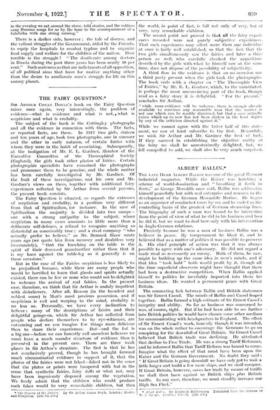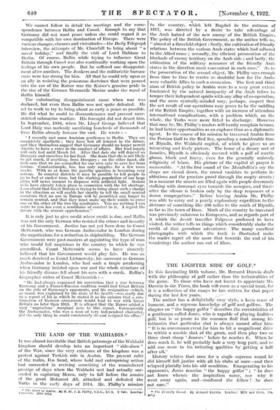ALBERT BALLIN.*
THE LATE Haan ALBERT Ba Lux was one of the great German industrial magnates. While the Kaiser was hatching a scheme of world-domination and " breathing it forth in fleets," as George Meredith once said, Ballin was addressing himself peacefully but with real enterprise and acumen to the development of the German Mercantile Marine. He began as an organizer of conducted tours by sea and he ended as the controlling brain of the greatest of German steamship lines. The biography of such a man was bound to be interesting from the point of view of what he did in his business and how he did it, but we want to deal here only with his intervention in Anglo-German relations.
Precisely because he was a man of business Ballin was a believer in peace. By temperament he liked it, and he believed that as a matter of politic's it was possible to preserve it. His chief principle of action was that it was always possible to agree with one's adversary. He did not regard a trade rival as necessarily an enemy. Both of them, he saw, might be building up the same idea in men's minds, and if that idea " took hold " both would profit by it, though all the time superficial observers might have thought that there had been a destructive competition. When Ballin applied himself to politics he inevitably imported into than his business ideas. He wanted a permanent peace with Great Britain.
The connecting link between Ballin and British statesmen was Sir Ernest Cassel. The minds of Bailin and Cassel leaped together. Ballin formed a high estimate of Sir Ernest Cassel's integrity and ability. So far as business was concerned he was, of course, right. But if he had been able to sec further into British politics he would have chosen sonic other medium for communicating with headquarters in England. The effect of Sir Ernest Cassel's work, honestly though it was intended, was on the whole rather to encourage the Germans to go on conspiring for the downfall of Great Britain. Sir Ernest Cassel believed that British trade was declining. He attributed that decline to Free Trade. He was a strong Tariff Reformer, and he informed Ballin that Tariff Reform was bound to come. Imagine what the effect of that must have been upon the Kaiser and the German Government. No doubt they said : " If Great Britain is going downhill we have only got to wait a little longer and build a few more ships, and we shall conquer. If Great Britain, however, saves her trade by means of tariffs we shall then have against us British ships plus British tariffs. In any case, therefore, we must steadily increase our High Sea Fleet".
• Anett Bailin. By Bernhard Iltddermann Translated true the: German by
We cannot follow in detail the meetings and the corre- spondence between Bailin and Cassel. Enough to say that Germany did not want peace unless she could regard it as compatible with her own domination of Europe. There were
various changes, chances and vicissitudes—the Daily Telegraph
interview, the attempts of Mr. Churchill to bring about " a naval holiday," and finally the visit of Lord Haldane to Berlin. Of course, Bailin while trying to influence Great Britain through Cassel was also continually working upon the feelings of his own people. But he suffered one disappoint- ment after another, The Junkers and the militaristic bureau- crats were too strong for him. All that he could rely upon as an ally in resisting the poisonous doctrines that were poured into the ear of the Kaiser was the Kaiser's genuine pride in the rise of the German Mercantile Marine under the wand of Bailin himself.
The culminating disappointment came when war was declared, but even then Ba.11in was not quite defeated. He set to work to try to bring about as early a peace as possible.
He did what he could to discountenance and prevent unre- stricted submarine warfare. His foresight did not desert him.
In September, 1916, when Mr. Lloyd George believed that Lord Haig was uselessly sacrificing hundreds of thousands of lives Bailin already foresaw the end. He wrote :-
" I recently met some Austrian gentlemen in Berlin. They are completely apathetic ; they have lost all interest in the future, and they themselves suggest that Germany should no longer permit Austria to have a voice in the conduct of affairs. Her food supply will only last until March 1st. After that date she will depend on Hungary and ourselves for her. food. She fears that she is not likely to get much, if anything, from Hungary ; on the other hand, she feels sure that we are compelled for our own sake to save her from famine. Constantinople, too, has only supplies for a few more weeks. With us at home the paraffin question is becoming very serious. In country districts it may he possible to tell people to go to bed at curfew time, but the working population of our large cities will never consent to dispense with artificial light. Serious riots have already taken place in connexion with the fat shortage. I am afraid that Great Britain is trying to bring about such a change in the situation as will enable her shortly to tell the small neutral countries that no one in Europe will be permitted any longer to remain neutral, and that they must make up their minds to enter one or the other of the two big syndicates. You see nothing I can write to you has even a semblance of comfort in it. I regard the future with the utmost apprehension."
It is only just to give credit where credit is due, and Ballin was not the only German who resisted the crimes and insanity of his Government. Justice has not yet been done to Count Metternich, who was German Ambassador in London during the negotiations for a reduction in shipbuilding. The German Government were past-masters at appointing the type of man who would lull suspicions in the country to which he was accredited. Count Metternich seems to have sincerely believed that his Government would play fair. He was as much deceived as Count Lichnowsky, his successor as German Ambassador in London, who had such a tragic awakening when Germany insisted upon war and the whole structure of his friendly dreams fell about his ears with a crash. Ballin's biographer writes of Count Metternich :-
" lie had always expressed his conviction that a war between Germany and a Franco-Russian coalition would find Great Britain on the side of Germany's opponents, and his resignation—which, as usual, was explained by the state of his health—was really due to a report of his in which he stated it as his opinion that a con- tinuation of German armaments would lead to war with Great Britain no later than 1915. It is alleged that the Kaiser added a very `ungracious' marginal note to this report. Consequently the Ambassador, who was a man of very independent character, did the only thing he could consistently do and resigned his office."







































 Previous page
Previous page